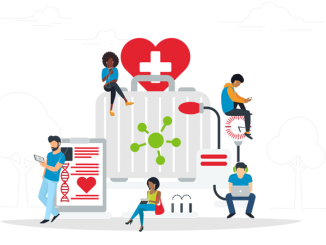Introduction
Cloud computing in healthcare offers numerous advantages for a healthcare organization. It lowers the cost of infrastructure and software, enables data sharing and collaboration among clinicians, and provides security. Cloud computing helps to improve efficiency, reduce costs, and streamline processes for organizations by enabling them to store data on remote servers instead of on-site computers or laptops. The ability to access your files anywhere you go at any time makes it easier for medical professionals to collaborate more efficiently than ever before.
You can enroll in the Knowledgehut cloud computing certification courses online to learn the most in-demand Cloud Computing skills from industry experts. The course will help you master the tools, technologies, and trends driving the Cloud Computing revolution so that you can advance your career in cloud computing.
What Is Cloud Computing?
Cloud computing is internet-based computing in which shared resources, software, and information are provided to computers and other devices on demand. The cloud can be accessed from any device with an Internet connection.
Cloud computing provides users with various advantages over traditional methods of accessing information. It allows for easy access to data from anywhere at any time, greater scalability than traditional systems could provide and high levels of security due to the use of encryption technology.
The cloud has become a popular option for businesses and individuals to store, manage and access their data. Cloud computing services offer the benefits of accessibility anywhere, anytime and on any device.
Benefits of Adopting Cloud Computing in Healthcare
Several benefits are associated with the implementation of cloud computing in healthcare, including:
Convenient Interoperability: Interoperability aims to create data integrations between healthcare systems, no matter where the data is stored. It is important to note that cloud-based solutions make patient information accessible for flexible distribution and insight into healthcare delivery, facilitating interoperability and delivering better care to patients.
The use of cloud technology in healthcare allows medical professionals to access their patient’s medical data from major sources, distribute it among primary stakeholders, and deliver protocols according to schedule.
Cost Savings: Cloud computing reduces the operating costs of IT infrastructure because it enables organizations to share resources across a network. It results in significant cost savings for healthcare providers, especially those with a large staff and high wages.
Flexibility: Cloud computing allows you to quickly scale up or down your IT infrastructure as needed, which is particularly useful for healthcare providers that need flexible capacity during peak times (such as flu season) without having to invest in expensive on-premises hardware.
Scalability: Like flexibility, scalability refers to a system’s ability to grow or shrink according to demand—you can adjust your resources on an almost real-time basis by adding more servers as needed (or shutting them down when they’re not being used).
Reliability: Because data is stored offsite at a remote location rather than locally on one server, cloud services are less likely than traditional systems, such as mainframes or clusters running under heavy load conditions, due to their increased reliability. Healthcare providers need to ensure the integrity of critical patient data at all times.
Security: Cloud computing offers an added layer of security because it stores your data in remote locations rather than on-site servers or hard drives. Plus, many cloud service providers offer managed services (which means they manage your network infrastructure and security settings), so you don’t have to worry about protecting against threats such as ransomware or malware infections.
Enhanced Collaboration: As cloud technologies are applied to healthcare, the collaboration between healthcare providers and patients improves. The fact that the EMR in the cloud can be accessed by patients anywhere, at any time, is a major benefit.
It also enables doctors to share data, review previous consultations, and share data as part of their decision-making process. It saves doctors and patients time while also making diagnosis and treatment safer and more accurate.
Opt for KnowledgeHut Cloud Computing Certification Courses, which will help you build competency in managing cloud storage, databases, networking, security, and analytics to avoid risks associated with cloud computing.
Types of Cloud Computing in Healthcare
Cloud computing can be divided into three categories:
Public Cloud Computing: This service is available to the public and can be accessed over the internet. It’s a pay-as-you-go model, so you only pay for what you use, which makes it attractive to many businesses. The downside is that your data may not be as secure as it would be if stored on your servers, but public clouds are typically more cost-effective than other cloud solutions.
Private Cloud Computing: A private cloud is a network that spans two or more physical locations and allows users access to information from any location in real-time. The advantage of this cloud solution is that it provides all the benefits of an external provider but allows enterprises more control over their data security and access policies thanks to its internal setup.
Hybrid Cloud Computing: This is a combination of private and public cloud services that allow IT departments to have some control over their data while also taking advantage of the flexibility offered by a public cloud provider. The benefit of this type of system is that it allows companies to decide what data they want on their servers and what data they want to store externally.
How Can Risks Be Avoided When Using Cloud Computing in Healthcare?
You can reduce risk by choosing a cloud provider that is HIPAA compliant, has a robust security policy and has proven its competence in security. It will help ensure you meet the standards set by NIST, HHS, and other federal agencies.
The larger your organization is, the more difficult it might be to find a suitable cloud computing provider. Since the requirements are strict for the industry (HIPAA), smaller companies may have fewer options than larger ones when it comes down to picking out one of these providers.
Smaller companies should look into what types of certifications they need before signing contracts with potential providers and check if there are any laws or mandates regarding this type of service within their state, province or country.
If you are a healthcare provider, you should be aware of the requirements for cloud computing and keep them in mind when choosing a provider. If you don’t want to worry about compliance and security issues, it may be best to stick with on-premise solutions.
Conclusion
Cloud computing is a revolution in healthcare, which allows us to use data and knowledge in the most efficient way. It will help save money and resources and make our lives easier by providing access to information from anywhere at any time. However, to better understand everything about cloud computing concepts, it is recommended that you must pursue the Knowledgehut cloud computing certification courses.
FAQs
- What is cloud computing for healthcare?
Cloud computing in healthcare is the practice of storing, managing, and processing healthcare-related data on remote servers accessible via the internet.
- How is cloud computing used in the healthcare industry?
The cloud enables healthcare technologies such as electronic medical records, patient portals, mobile apps, big data analytics and IoT devices. It ensures scalability and flexibility, which improves the overall decision-making process.
- What are the advantages of cloud computing in hospitals?
Thanks to cloud computing, doctors and hospitals can now increase patient engagement by providing them with anywhere, anytime access to their medical data, test results, and even doctor’s notes. It empowers patients and increases their knowledge of their medical conditions.
Is a freelance tech writer based in the East Continent, is quite fascinated by modern-day gadgets, smartphones, and all the hype and buzz about modern technology on the Internet. Besides this a part-time photographer and love to travel and explore. Follow me on. Twitter, Facebook Or Simply Contact Here. Or Email: [email protected]









Leave a Reply